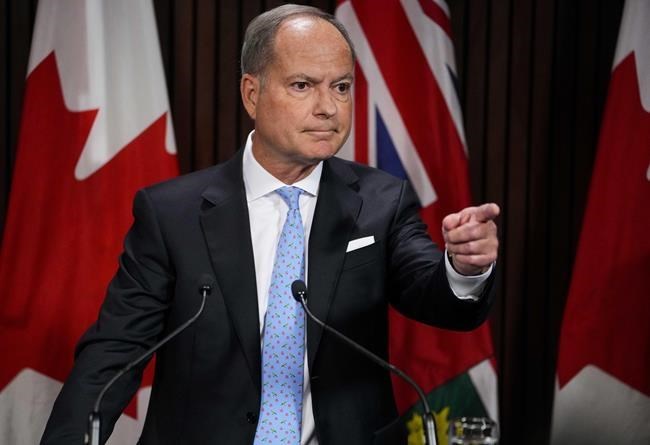TORONTO — Ontario's budget is set to be tabled Thursday amid both surging revenues and a potential economic slowdown, and while the finance minister has been signalling "restraint," he says that doesn't mean program cuts.
Finance Minister Peter Bethlenfalvy says the vision he will set out Thursday afternoon will be a plan to attract jobs and build — keeping on a favourite theme of Premier Doug Ford's infrastructure-focused government.
"I don't think you can cut your way to prosperity," he said Tuesday.
"Things are changing out there. These are uncertain times and so what's so important in uncertain times, and very serious times, is to have a plan."
Ontario's fall economic update forecast a deficit of $8.1 billion for the upcoming fiscal year and a relatively small deficit of $700 million in 2024-25, though those figures are likely to change.
In the third-quarter finances released last month, the province cut its deficit projection for this year in half from that fall update — down to $6.5 billion. It also revised its revenue projections for the year by nearly $10 billion, just in the span of a few months since the fall update.
Those booming revenues — due to higher-than-expected inflation and nominal GDP growth — were also responsible for Ontario ending 2021-22 with a surprise $2.1-billion surplus, which was a far cry from the $33 billion projected in the 2021 budget.
Bethlenfalvy has previously said that after unprecedented spending to respond to the COVID-19 pandemic, now is the time for governments to show "restraint."
"Irresponsible spending today will only make inflation more painful and drag out an economic downturn," he said late last year.
Marc Desormeaux, principal economist of Canadian economics at Desjardins, said there is both good news in the revenues and bad news in economic uncertainty in Ontario.
"Normally, when we see revenue windfalls of that magnitude, there tends to be a carry-forward effect that improves the budget balances in the next year," he said.
"We seem to also be seeing signs of weakness in the Ontario economy. The housing market, of course, has weakened more significantly than most of the rest of the country and in fact, if you look at household consumption in Ontario, it fell by almost four per cent in the third quarter of last year, which was — excluding the pandemic — the worst quarterly decline since the early 1990s."
Karl Baldauf, a vice-president at public affairs firm McMillan Vantage and a former chief of staff to Bethlenfalvy, said the minister has shown a pragmatic and not ideological approach to the provincial balance sheet.
"The interest on deficit budgets needs to be, of course, kept under control, but if the stimulative impact of that investment is greater than the cost of the interest, then I think this government would see it as an important investment," he said.
The Ontario Chamber of Commerce, in its pre-budget submission, urged the government to not put too much focus on quickly balancing the budget.
"As interest rates rise this year, governments must maintain fiscal prudence," president and CEO Rocco Rossi wrote.
"However, as the province has locked in low long-term rates, the cost of servicing the province’s public debt should not grow significantly as a portion of the budget. Eliminating the debt need not take priority over growth-enabling investments."
Baldauf said he will be watching for what strategic investments the government plans in order to stimulate economic development in the face of the risk of a recession, including in the critical minerals sector and building a long-promised road to the Ring of Fire.
"Is this government going to finally get serious about that? Is that vital to the vision that they will bring in terms of in terms of a critical mineral strategy?" he said.
"This is a government that expanded their voter coalition into northern Ontario in new and important ways. You've got to think that the premier wants to demonstrate to the north that that was a good decision, so that by the time the next election comes around, there's some real benefits that the north can see tangibly."
Ford announced Wednesday that a new manufacturing tax credit in the budget would give Ontario manufacturers up to $2 million a year.
The 10 per cent refundable corporate income tax credit could be used by Canadian-controlled private corporations with a permanent location in Ontario on qualifying investments in buildings, machinery and equipment for use in manufacturing or processing.
That announcement follows news on Tuesday that the budget will include $224 million more to build and upgrade training centres, part of a push to boost the skilled trades as the government plans major hospital, highway and home building over the next decade.
But the premier has already nixed at least one budget request. The chamber of commerce also urged the government to help the cannabis sector by allowing consumption lounges.
Not happening, Ford said Tuesday.
"I don't like the idea of having a lounge outside and they're smoking their doobies, or weed or whatever the hell they call it — sorry — whatever the heck they call it nowadays, and some kids walk by and there's all this smell? I don't know, I don't like that personally."
This report by The Canadian Press was first published March 22, 2023.
Allison Jones, The Canadian Press


